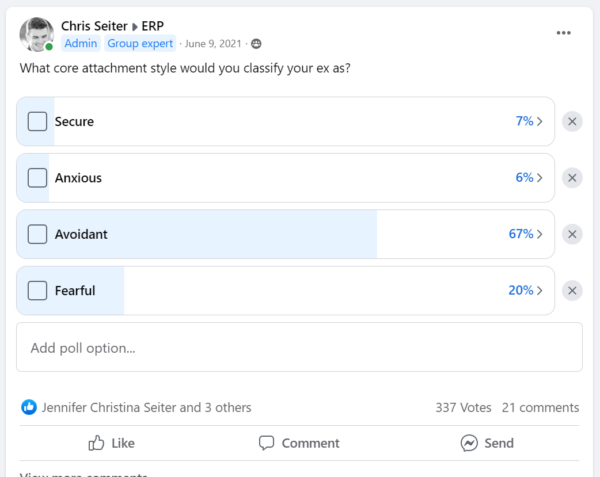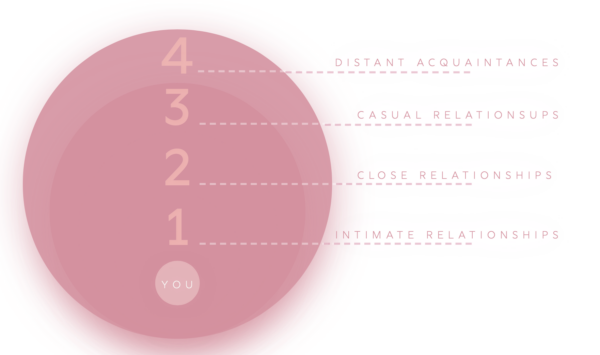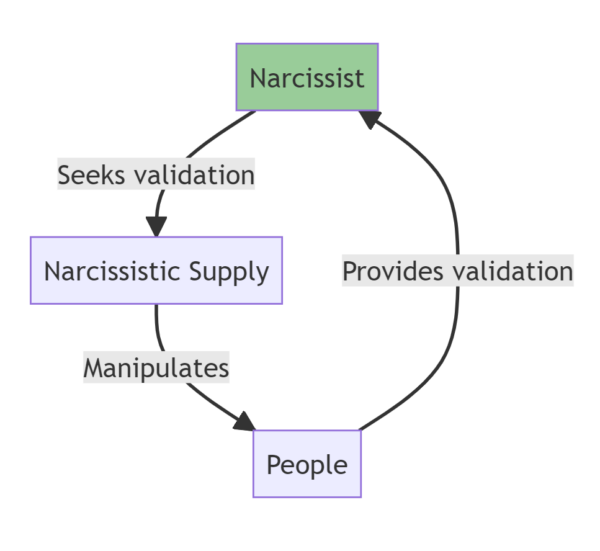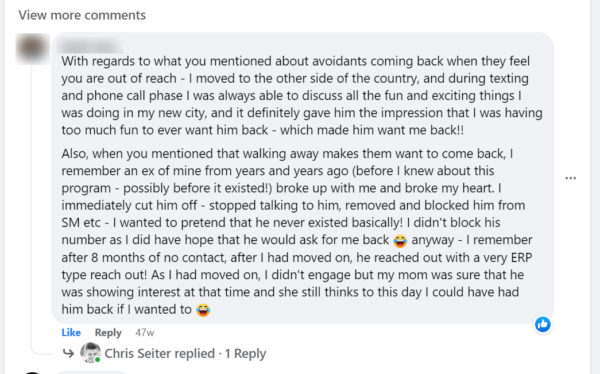Can being friends with an ex actually lead to getting them back?
It’s an interesting question. My answer is probably going to be on the controversial side.
In my opinion, being friends with your ex “to get them back” usually doesn’t work. There is one exception though. The one scenario where it can work is if they’ve actually moved on to someone else.
Here’s the thing though, no one ever really talks about WHY.
That’s something I plan on rectifying with this article. I’m going to take you through why psychology tells us that being friends with an ex doesn’t work.
Let’s begin!

What Are Your Chances of Getting Your Ex Boyfriend Back?
Take the quizLooking At The Top Ten Results Of Google (And Why I Emphatically Disagree With The Majority)
When you Google “can being friends with your ex lead to getting back together”, the top ten results typically offer two perspectives.
- Being friends with an ex can work and actually increases the odds of a recovery
- Being friends with your ex can work but it’s unlikely.
60% of my peers believe that being friends with an ex works and can actually be a “shortcut”
I completely disagree with them and actually fall into the second camp. In fact, I would argue that those that are friends with their ex and actually get their exes back tend to be outliers. The majority of people who try this approach will usually end up failing.
There is one exception to this, of course, I’ve hinted about that above, but we will talk about that later.
For now I’d actually like to explain to you WHY being friends with an ex to get them back rarely works.
Why Being Friends With An Ex To Get Them Back Rarely Works
I frequently emphasize the importance of understanding attachment styles in nearly all my articles.
Specifically, it’s crucial to recognize:
- Your own attachment style
- That of your ex.
Luckily, my team and I have done most of that work for you.
A few years back I actually polled our audience to ask them, ‘What core attachment style would you classify your ex as?’
A significant 67% believe their exes display dismissive avoidant tendencies.
This is based on a sample size of 337 votes, indicating a statistically significant response.
The challenge with dismissive avoidants is that they often harbor a deep-seated fear of losing their independence. Any action that threatens their sense of autonomy—like discussing moving in together—can trigger their avoidant tendencies.
I’ve even seen this happen due to their sphere of influence,
If you’re not familiar the SOI (sphere of influence) is a term referring to the people exes surround themselves with and whose opinions they value.
I’ve observed instances where an ex’s family can pressure them about marriage or having a child, which they perceive as an assault on their independence.

What Are Your Chances of Getting Your Ex Boyfriend Back?
Take the quizCausing them to clam up and flee
This obviously doesn’t directly explain why being friends with an ex might not work, I believe it offers some insight. If your ex desires space and independence, being persistently present in their life could be viewed as intrusive and annoying.
It’s important to note that most avoidants, especially if they initiated the break-up, probably assume that you want to reconcile.
The Fact That In The Back Of Their Mind Avoidants Probably Think You Want Them Back
There’s this really great quote from one of my favorite attachment resources, a website called FreeToAttach.com,
which suggests that avoidants often refrain from initiating contact with their exes. They seldom initiate reunions due to feelings of vulnerability and uncertainty about how to mend things. The thought of reuniting with someone they’ve significantly hurt, which inherently involves making amends, can challenge their need for independence and control in the relationship. These are fundamental needs for avoidants to feel safe and desirable.
So, the idea of you wanting them back is a non-starter—it consistently triggers them.
If you remain friends with them, they’ll likely suspect you want something from them, keeping them in a perpetual state of trigger.
This is why so many people who try to stay friends with an ex find that the ex suddenly becomes distant or ghosts them.
Occasionally, the ex might return, and while it may seem harsh to say they exploit their ex-partner, it’s often true. They turn to them for sexual or emotional support and then discard them.
Very similar to how the narcissistic supply operates,
They Actually Prefer To Keep You In This State Of Assumed Rejection
Interestingly, dismissive avoidants typically prefer to keep you in a state of assumed rejection.
Quoting again from FreeToAttach,
They find comfort in a state of assumed rejection and distance, especially if they’re the ones controlling it. This aligns with their internal belief system.
I believe ‘distance’ is the operative word here—being friends with an avoidant ex doesn’t provide the necessary distance.
Once again, quoting from Free to Attach,
“Avoidants subconsciously prefer space from others, rather than engaging in complex interactions. Even when conflicted or regretful, they often prefer loneliness over admitting possible mistakes.”
Thus, if you don’t provide your ex with space and instead persistently intrude into their life, they’ll likely assume you want them back. This assumption will consistently trigger their avoidant tendencies, leading them to distance themselves from you.
Why It’s Rare For An Avoidant To Want To Be Friends After A Breakup
Moreover, it’s relatively rare for avoidants to desire friendship after a breakup.
In fact, they’d rather label you as “the one that got away” or “the one who longs for me from a distance.” This is their comfort zone. If you doubt this phenomenon, consider my research on the “Avoidant Phantom Ex Syndrome.”
Avoidants tend to create these phantom exes in their minds as a mechanism to keep their current partners at arm’s length. They generally do not want to be friends; they prefer to receive or fantasize about love from a safe distance.
The great irony here is that by not attempting to maintain a friendship and instead moving on, you might actually elevate your perceived value and make your ex want you back. That’s why I argue that being friends with an ex is ineffective, whereas moving on works.
I actually discussed this concept in a video I shared on YouTube and within our community. The video explores why walking away from your ex is a preferable strategy.

What Are Your Chances of Getting Your Ex Boyfriend Back?
Take the quizAfter posting the video, I received a noteworthy comment that reinforces this perspective.
The commenter shared,
“Regarding your point about avoidants coming back when they feel you’re out of reach, I once moved to the other side of the country. During our text and phone call conversations, I would share all the fun and exciting things I was doing in my new city. It gave him the impression that I was too busy enjoying life to want him back, which ironically made him want me back.”
The commenter further shared a past experience,
“Years ago, an ex broke up with me and shattered my heart. I immediately cut him off, removed and blocked him on social media, and essentially tried to erase him from my life. I kept his number unblocked, harboring some hope that he might ask for me back. After eight months of no contact, after I had moved on, he reached out in a way that felt like he was showing interest again. I didn’t engage, but my mom was convinced that he was interested and believes I could have had him back if I’d wanted to.”
This experience emphasizes that walking away can be effective while attempting to remain friends often isn’t. Of course, there’s one exception to this rule.
The One Exception Where It’s Ideal To Be Friends With An Ex
I’m known for a concept called the “Being There Method,”
Which my team and I discovered quite by accident through observing what worked for our clients whose exes had moved on to someone else.
If you’re trying to win back an ex who’s moved on, the initial step is to give them some space.
However, after that period, it may be beneficial to ‘friend zone’ yourself.
Here’s the critical part: your goal isn’t to steal your ex away. You’re simply there, establishing a friendship with your ex and hopefully spending more time talking to them than their new partner does.
This strategy banks on the fact that your ex likely has a dismissive-avoidant attachment style.
Your consistent presence, especially if you’ve been working on cultivating a more secure attachment style during the ‘no contact’ period, can make the new partner feel threatened and anxious. As a result, this can trigger the avoidant tendencies in your ex.
The anxiety created by your presence and continued friendship can lead to the triggering of their fear of losing independence, creating friction and potentially making you a preferred option over their new partner.
This is the only scenario where I would recommend being friends with an ex.
There are always exceptions, of course, but typically, trying to maintain a friendship with an ex is not effective.
The kind of scenario in which I recommend the “Being There Method” is quite rare too; only about 10-15% of our clients fit into this category. So, although these cases are uncommon, in such instances, you do want to be friends with your ex. That, however, is the only situation where I’d advise this approach.



